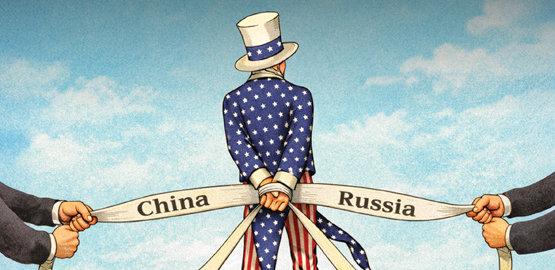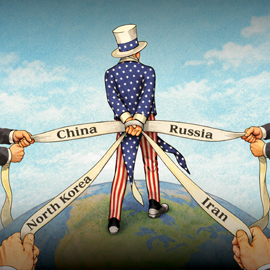Dealing with problems associated with operating and building a fleet can be so self-absorbing that one could miss how changes in the strategic environment are increasing the need for maritime thinking and sea power in general. Unfortunately, Western navies are not well disposed to understand and relate the broader implications of those changes to naval purpose – which of course must be defined before embarking on efforts to redesign and recapitalize the fleet. In terms of time and talent, the focus is on finding high-tech solutions to operational-level problems. In these naval institutions, that which is learned and inculcated is limited to that which is useful in the context of naval operations. While strategic and economic history is not thought to be of much use, it is precisely the kind of knowledge needed to understand such implications and think in maritime terms.
But what does it mean to think in maritime terms? Naval strategy is about employing seaborne military force for political purpose. Maritime strategy expands the calculus beyond military interests to encompass and interrelate economic, political and military interests. Unlike those associated with land or air power, maritime strategy has always concerned itself with the relationship between the state and global markets.
Maritime thinking therefore requires an understanding of how the global economy functions. It requires understanding the adversary’s economic, political and military and naval strengths and vulnerabilities in light of one’s own. It is about how to use the naval instrument to accumulate and distribute wealth among allies and prevent the adversary from doing so. Practically speaking, maritime strategy is about ensuring access to resources, markets, supply chains, lines of production, capital, partners and battlefields – as well as denying the enemy the same.
So, why is the need for maritime thinking so compelling? It begins with globalization – the defining characteristic of the strategic environment. As was the case during the last era of globalization, which the First World War extinguished, globalization shifts the security calculus toward a greater emphasis on economics, which is the cornerstone of any maritime strategy.
Past or present, globalization is brought about by the expansion of the global economy and the global integration of trading and financial systems. It is driven by a revolution in telecommunication and transportation technologies, the spread of Western rationality, norms and culture, and the adoption of free-market economies. All of this enables vast movements of trade, capital, information and ideas. Globalization increases interdependencies between states, thereby inextricably linking economic and political interests. It makes states less self-sufficient and more dependent on trade.
As in the case of Wilhelmine Germany (which existed between 1890 and 1918) and the United States in the last era of globalization (roughly 1840s to 1914) and China in the current era, globalization helps elevate some states to great power status. Globalization brings about great power competition and increases the sources of conflict between those powers. It fuels the aspirations of powers like Germany and China and their efforts to challenge the world order. Globalization reconfigures the balance of global power, shifting relative power away from the status quo powers to the rising ones. All of this makes for a mutually vulnerable and more negotiated and multi-polar world.
In an era of globalization, the locus of strategic attention shifts not only to economics, but offshore as well. Globalization is marked by fierce competition for global markets, far-flung resources (particularly energy, labour and food) and influence. It is characterized by the efforts of rising powers to construct globe-spanning commercial empires, financial institutions and the wide-ranging naval forces necessary to protect those economic interests. Overall, it is characterized by an appreciation that trade, as Dan Moran and James Russell note, is “a crucial source of political power, and of explicit or implicit strategic leverage.”
Since world trade is essentially maritime trade, competition to ensure access to markets, resources (particularly capital and petroleum) and information (much of which flows via undersea cables) will intensify in peace and will be heavily contested in war. In such an era, financial and naval power come to the fore. As the economist, Julian Snelder notes, since “oil and U.S. dollars are the most important resources in the world today, the two branches of the U.S. government that other nations fear the most are the Navy and the Treasury Department.”
Globalization ushers in the possibility of great power conflict – sweeping in its costs and consequences to world order. As was the case with the First World War, such a conflict threatens the collapse of the international political and economic system. This system, the rules, regimes and institutions of which were largely designed by the United States, is the well-spring from which the United States – as well as its allies and trading partners, particularly China – draws its power, influence and ability to provide for and defend its way of life, its homeland and the system itself. Since 1945, this system has brought unprecedented prosperity and freedom to ever-expanding parts of the world. Once destroyed, as it was after the First World War, it takes much longer to rebuild. Ostensibly, it is in the interest of every state to prevent great power war.
Globalization, however, brings the seeds of its own undoing. States are taking steps to reduce their dependencies and insulate their societies. Some are rejecting free-market ideals by cornering markets and resources and embracing the type of ‘beggar thy neighbour’ policies of the 1930s that helped usher in the Second World War. In a deglobalizing world, the drive for short-term self-interested gains will only increase.
Regardless of where globalization might lead, however, it is well to remember that it is in the context of great power war that navies exert their greatest strategic leverage. As Dan Moran notes, “[t]he surest path to victory in any global conflict ‘hot’ or ‘cold’ is to conduct yourself so as to ensure that the rich countries and critical resource areas of the world end up on your side. This has been the essence of maritime strategy since the Age of Sail, and there is no reason to expect the pattern to change anytime soon.” The more protracted the conflict and the more one can leverage its industrial capacity, the more decisive sea power becomes.
Unfortunately, the United States and its allies and their respective navies have not thought deeply about great power competition and what such conflict might look in an interdependent world. This should not be surprising. How the United States and the US Navy adapted to the immense challenges of the Cold War did not compel a need for either to think in maritime terms.
Unlike Wilhelmine Germany and China, the Soviet Union’s economy was not integrated into the global economy. Unlike the British Admiralty and British leaders before the First World War, neither the US Navy nor the leaders of the United States, which was not dependent on trade for food and capital, gave much thought to how to use the naval instrument to enervate Soviet economic strength and insulate the West’s economy. They had little need to think about not just blockade but more broadly how to use that instrument against the mechanisms of Soviet economic and financial power. They did not need to consider how their decisions might affect the economic well-being of US allies and key neutral trading partners, whose support affects how and to what extent they can prosecute particularly a protracted war.
During the Cold War, the United States and NATO did not think deeply about how to win a protracted war; the emphasis was on deterring war. Unlike the British example before the First World War, there was no need to understand how to wage war without inviting mutually assured economic destruction or how their decisions might affect international trade, the stability of the global economy, and the sustainment of the world order.
The fact that NATO-Europe shared borders with the Soviet Bloc meant that the locus of US strategic attention was not offshore, it was on the Central Front in West Germany. This is a reminder that the maritime-based geostrategic context of the competition with China is fundamentally different than that of the Cold War. US strategy fixated not on the system, but on deterrence, the Soviet threat and the balance of military power. The nuclear bomb also helped obviate the need for the United States to develop excellence in systemic management, economic and alliance diplomacy, and relating naval power with economic and political power to greater strategic effect.
Since the Cold War did not demand competency in maritime thinking on the part of the US government, its leaders saw no need to demand the same of its navy. Good or bad, the US Navy was free to define its purpose, identity and fleet structure and did so around the style of warfare that had brought victory in its seminal experience – not the Battle of the Atlantic, but the power projection-oriented Pacific campaign against Japan.
A maritime-based strategic outlook is well-suited to the interests of liberal states like the United States and Canada, the prosperity and security of which are dependent upon the vitality of the world economy and adherence to free-market and democratic policies that have sustained economic prosperity thus far. However, it has been the Chinese – the world’s most avid readers of Alfred Thayer Mahan, the maritime historian and political economist – who have most readily grasped the need to think in maritime terms in an interdependent world. The United States and its allies and their respective navies have a way to go just to understand that need, and the implications of thinking in maritime terms to naval purpose and fleet recapitalization.

























